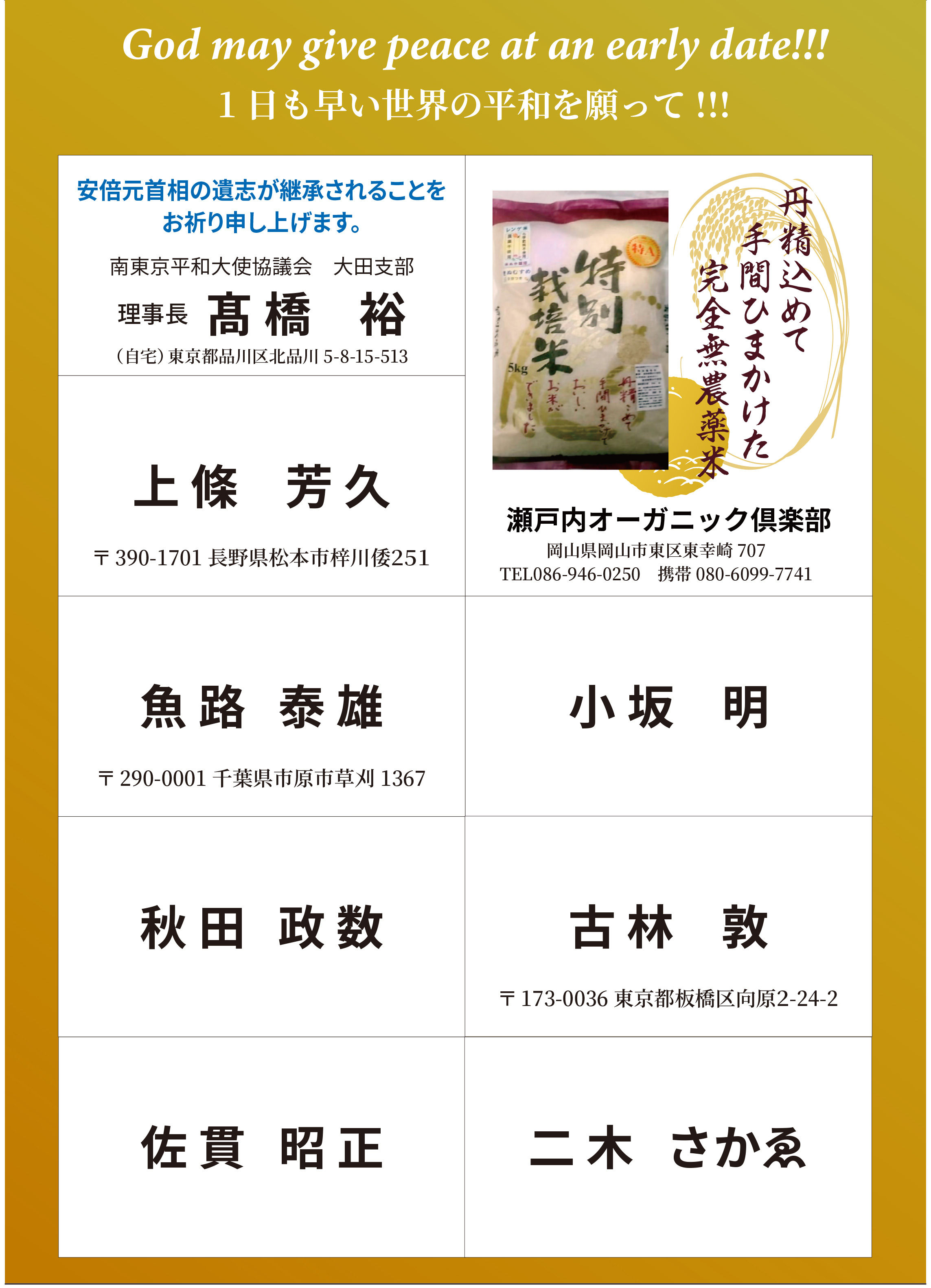Former Prime MinisterShinzo Abe, who made Japan credible as a global peaceful nation.
By Ikuzo Kobayashi, President, Salaam Association
From the Summer Issue of the electronic “Salaam Quarterly Bulletin”, No.42, August 2022
I would like to offer my deepest condolences on the sudden death of former Prime Minister Shinzo Abe.
The contributions to peace in Japan and the world made by former Prime Minister Abe have been enormous and have been admired by former heads of state and government in Japan and around the world. In this issue of Salaam Quarterly Bulletin, the author would like to mourn him by reflecting on “Free and Open Indo-Pacific Initiative” which he dvocated and the “Security Law” enacted during histenure as Prime Minister.
Free and Open Indo-Pacific Initiative(FOIP)
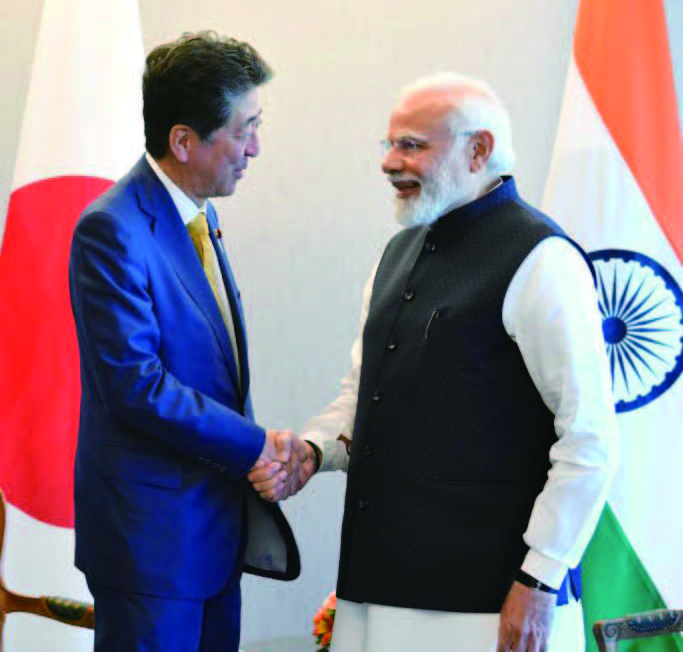
Left photo:“ Former Prime Minister Abe had deep ties with India” (Reuters/Afro) from Wedge ONLINE July 11, 2022
Former Prime Minister Shinzo Abe’s “Free and Open Indo-Pacific Initiative” was proposed at the Tokyo International Conference on African Development (TICAD) held in Kenya in August 2016. In his keynote address, then Prime Minister Abe said “It is the ‘Sea Route’ that connects Africa, Asia, and Japan. Africa, Asia, and Japan should take responsibility for the ‘free and open Indo-Pacific’ that provides stability and prosperity to the world as a place that values a market economy governed by rules.”
The concept of the “Sea Route” mentioned in this speech originated in 2007, during the first Abe Cabinet, when Prime Minister Abe delivered a speech to the Indian Parliament, titled “The Intersection of Two Seas,” written by Indian Mughal Prince Dara Shikoh, in which he stated that the Pacific and Indian Oceans should be the seas of freedom and prosperity, and India and Japan should fulfill their roles in preserving the safety of the sea lane particularly. (Ministry of Foreign Affairs: Prime Minister Abe’s speech to the Indian Parliament, “The Intersection of the Two Seas” (see mofa.go.jp))
During my visit to Japan this past May 2022, I had the opportunity to meet Mr. Abe, who had just assumed the presidency of the Japan-India Association. He was his usual self – energetic, charming, charismatic, and very witty. He had innovative ideas on how to further strengthen the India-Japan friendship. When I said goodbye to him that day, I could not have imagined that this would be our last meeting. I will always be indebted to him for his warmth and wisdom, grace and generosity, friendship and guidance, and will miss him dearly. (Indian Prime Minister Narendra Modi posted a statement “My Friend, Abe” on his website. (Excerpts from it)
Expanded global understanding and support for FOIP
With heightened concerns about China’s hegemonic expansion into the ocean, the global support for the Free and Open Indo-Pacific (FOIP) is increasing. In April 2021, India participated for the first time in “La Perouse,” a joint exercise by the French Navy and Japan, the U.S., Australia, and India in the Bay of Bengal in eastern India. With Germany, “Japan-Germany 2 plus 2” was held to commemorate the 160th anniversary of Japan-Germany relations.
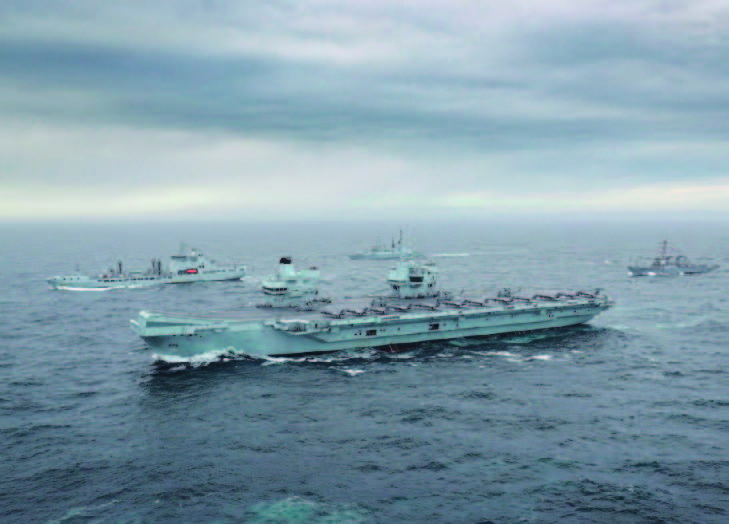
QUEEN ELIZABETH Carrier Strike Group during an exercise (FlyTeam Online News, delivery date: April 2, 2021)
The British carrier strike force conducted operations against Islamic extremists (Islamic State militants) as it transits through the Middle East. The strike force will call at Singapore after conducting training exercises with Indian troops. And after conducting a “freedom of navigation” exercise in the South China Sea, it had called at Yokosuka. British Defense Minister Wallace said his longterm vision for defense, security, and foreign policy is “to have a permanent presence in the Indo-Pacific region.”
Post-Cold War between the U.S. and the Soviet Union – Japan’s Transformation
However, it took 20 years for the world to openly accept Japan’s peace initiative, which took the form of the “free and open Indo-Pacific.
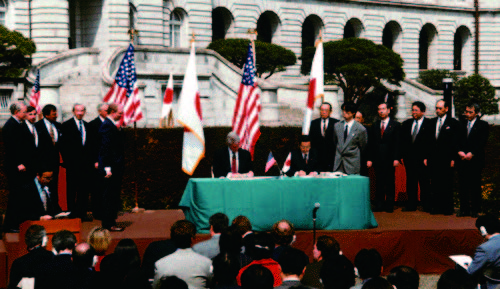
Japanese Prime Minister Ryutaro Hashimoto and United States President William J.Clinton announce the Japan-U.S. Joint Declaration on Security on April 17, 1996.
Although the end of the Cold War has removed the threat of a world war, the removal of the weight of the U.S. and Soviet powers has led to the emergence of regional hegemony and the rise of nationalism based on different religions and cultures, resulting in numerous conflicts. Conflicts in Eastern Europe, Africa, and the Middle East can be cited as examples. East Asia, on the other hand, remained a potentially unstable region where the level of danger remained high.
In addition, during the Gulf Crisis and the Gulf War of 1990-91, Japan was unable to contribute human resources, even though it was the second largest economic power in the world due to the economic development propelled by the crude oil import from the Gulf countries since 1960. The United States and the rest of the world were not satisfied with Japan’s response. Japan’s prestige was severely damaged.
The late Kaoru Yosano, a member of the Diet, testified that he had thoroughly studied UN peacekeeping operations (PKO) in order to promote human contributions. Then, in June 1992, the UN Peacekeeping Operations (PKO) Cooperation Law was enacted. Since then, PKO activities in which the Self-Defense Forces participated have intensified in Cambodia, Mozambique, the Golan Heights, and East Timor.
After the end of the Cold War, Japan was able to pave the way for “international cooperation and deployment of the Self Defense Forces. This was a historic shift in the nature of Japan’s defense from “one-nation pacifism with an emphasis on economic development with light armament to international cooperation.”
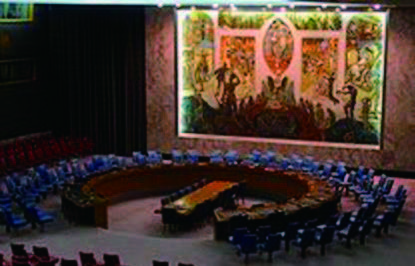
Meeting Hall of the United Nations Security Council
The end of the Cold War between the U.S. and the Soviet Union with the collapse of the Soviet Union in 1991 removed the threat of a world war between the East and the West. However, in 1993, North Korea withdrew from the Nuclear Non-proliferation Treaty (NPT) and declared its intention to possess nuclear weapons, and in 1994, then Taiwanese President Lee Teng-hui expressed his desire for independence. In response to this, China conducted a large-scale missile exercise and threatened Taiwan militarily. These events reminded Japan and the U.S. of the instability of the East Asia region.
In April 1996, the Japan-U.S. Joint Declaration between Japanese Prime Minister Ryutaro Hashimoto and U.S. President Bill Clinton announced expanded Japan-U.S. cooperation in critical situations in “areas surrounding Japan.” In 1998, the Cabinet approved the Law Concerning the Peripheral Situation in Japan, which was enacted by the Diet in 1999.
The turbulent situation in the Middle East before FOIP gained global support
1)On September 11, 2001, the United States was hit by unprecedented terrorist attacks by the radical Islamic terrorist organization al-Qaeda; on September 12, the UN Security Council unanimously adopted UNSC Resolution 1368.UN Security Council Resolution 1368 stipulates in the preamble that the individual rights of individual or collective self-defense of the United States victimized by the terrorist incident and its allies are recognized in response to the terrorist attacks against the United States on September 11, 2001.
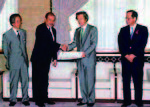
A catalogue of relief supplies for Afghanistan refugees has been handed by Prime Minister Koizumi (Director, International Peace Cooperation Headquarters) to UNHCR Japan-Korea Regional Representative Rochanakorn
At the request of the United States, Prime Minister Koizumi immediately enacted the “Special Measures Against Terrorism Law.” In October, relief supplies for Afghan refugees were delivered to Pakistan by Air Self-Defense Force transport aircraft.
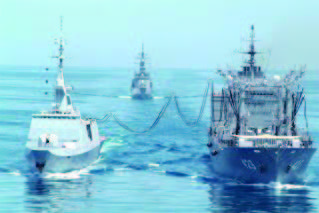
Self-Defense Force Deployment in the Indian Ocean: The dispatch of supply ships and destroyers of the Maritime Self-Defense Force from 2001 to January 15, 2010. Venue policing activities and refueling activities in the Indian Ocean. (Photo: Mainichi Shimbun, July 19, 2009)
Specifically, the Maritime Self-Defense Force was engaged in refueling operations in the Indian Ocean based on the establishment of the Terrorism Special Measures Law. This operation, in which refueling activities are carried out while sailing, required advanced technology, and although it was a logistical support activity, it enhanced Japan’s presence in the region.
Ships were inspected to interdict maritime movement of terrorists by 6 countries — the United States, Britain, France, Germany, Pakistan, and NZ. Japan decided to not participate in the main maritime interdiction activities, and instead to carry out supply support activities for ships of various foreign countries engaged in antiterrorism maritime interdiction activities based on the Special Measures Law for Supply Assistance.

In the dispatch of the Self-Defense Force to Iraq, GSDF Colonel Masahisa Sato served as the commander of the team to support the first reconstruction operations. The first bridge built by the Self-Defense Force was named“ SATO BRIDGE”. Taking advantage of his experience in PKO activities in Cambodia and the Golan Heights, he was affectionately nicknamed“ Colonel Sato intimately familiar with heart of Samawa” by the tribe chief of the Samawa.
2)After the Iraq War that began in 2003, the dispatch of the Japan Ground Self-Defense Force (JGSDF) facility units for reconstruction of Iraq was also appreciated and well received by the Iraqi people. Such post-conflict reconstruction assistance in various parts of the world was highly appreciated and requested by many countries.
However, in response to Japan’s deployment of the Self-Defense Forces in Iraq, there was a general perception that “Japan is bowing to the pressure out of fear of the United States. In the midst of such Iraqi sentiment, even though it was in a noncombat zone in southern Iraq, the confidence that the Self-Defense Force won from the locals was surprisingly passionate.
Prime Minister Abe’s Visit to the Middle East = Proactive Peace Diplomacy
When the second Abe Cabinet took office at the end of 2012, a year and a half after the Great East Japan Earthquake, there were still many issues to be resolved in the reconstruction process. Despite this, Prime Minister Abe began his proactive peace diplomacy with a visit to the Middle East.
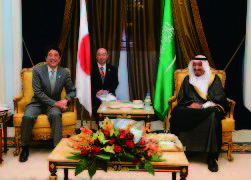
Meeting with Prince Mohammad bin Salman Al Saud of Saudi Arabia on April 30, 2013 (Photo provided by the Cabinet Public Relations Office)
The Arab Spring has spread to the Gulf countries. If it is perceived that Japan has come to seek only economic national interests, anti-Japanese sentiment by Islamic extremists may be channeled into anti-government movement in those countries to a different degree in each country.
It must not have been easy for him to visit Arab countries, where Japan was criticized for “Japan’s oil-begging diplomacy” in 1990s.
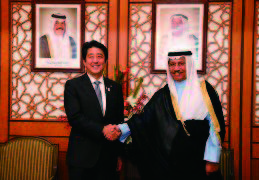
On August 26, 2013, Prime Minister Abe met with Kuwaiti Prime Minister Jabir
Prime Minister Abe’s Proactive Engagement for Peace
1)Proactive peace diplomacy to erase the stigma during the Gulf War
When the Gulf crisis occurred, the East-West Cold War had already come to an end. Despite the post-Cold War turmoil, the UN Security Council almost unanimously adopted a resolution that Iraqi forces should withdraw from the region. What should Japan have said or done for Kuwait in response to Iraq’s refusal to withdraw? Japan owed voluntary crude oil development to Kuwait, but Kuwait faced an imminent destruction. On August 10, 1990, an emergency Arab summit meeting was held in Cairo, where a resolution including seven items was adopted, including the dispatch of a joint Arab force to deal with Iraq’s invasion of Kuwait. However, no progress was made, and the UN Security Council finally adopted a resolution at the end of November that effectively authorized the use of force.
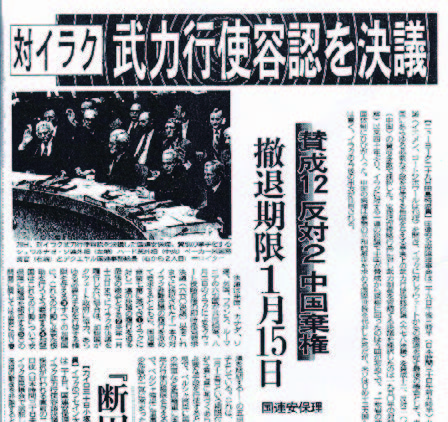
On November 29, the United Nations Security Council adopted the resolution 678 which virtually allowed use of force and all necessary measures to urge Iraq to withdr aw from Kuwait with final deadline of January 15, 1991. (November 30, 1990 evening in the Chunichi Shimbun)
However, Japan failed to send a clear signal. The world perceived Japan’s ambiguous attitude, its lack of human contribution, and its lack of “proactivity” toward peace as a result. The prestige of Japan as an economic superpower was damaged. In the U.S. Congress, the “Japan’s free ride on the security of the United States” theory erupted, and the question was raised, “Did even one member of the Japanese Diet say he would help the United States if it were attacked?” We cannot forget the criticism that was leveled at Japan in the U.S. Congress.
2) From the Emergency-at-Periphery Act to the Critical Impact Situations Act Article 98 of the Constitution states, “It is necessary that treaties concluded by the Nation of Japan and established international laws and regulations shall be faithfully observed.” Based on the UN Charter, which recognizes the right of collective self-defense, it can be said that Japan can exercise the right of collective self-defense. In particular, in this era of the war on terror, Japan faces a situation in which it cannot protect itself against crises based solely on the geographical concept of conventional geographical peripheries. It is imperative to deepen the concept of defense that is not bound by geographical scope, including peripheral situations, namely, the concept of critical impact situations.
3) On September 19, 2015, a security-related bill (security legislation) was passed. The enactment of this security legislation represented a comprehensive package to address security challenges in Japan’s own defense since the Abe Cabinet and administration were launched in December 2012. Those challenges include collective self-defense rights that match the international situation, Japan’s defense plan, review of the three principles of weapons export, etc., as well as dispatch of the Self-Defense Forces for “escort duty”, “joint defense of camps”, and preparations (information collection, education and training) enabling those activities in international peace operations.
International peace cooperation activities by the Self-Defense Forces have been carried out all over the world including neighboring Asian countries, Middle East countries, and Africa. The security legislation entered into force on March 29, 2016 as a legal system that facilitates international peace cooperation by the Self-Defense Forces, including not only participation in the United Nations peacekeeping operations but also support for other countries’ armed forces working for the peace of the international community.
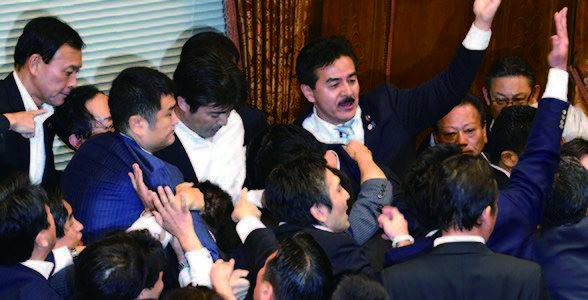
On September 19, 2015, a security-related bill (security legislation) was voted and passed at the House of Councilors plenary session amid the fierce battle between the ruling and opposition parties.
Since the second Abe administration came to power, Prime Minister Abe has pursued a proactive peace diplomacy. He first visited Middle Eastern countries to strengthen relations with them under the slogan of “Comprehensive Partnership for Stability and Prosperity.” He also proposed the concept of “free and open Indo-Pacific security,” and succeeded in adding Australia and India to the Japan-U.S. Security Treaty as a quasi-Japan security arrangement. This proposal was accepted by the U.S., and to this day, the U.K. and France, wary of China’s advances in the East and South China Seas, have also announced their participation. The initiative is now being expanded to include the security of the Western Pacific.
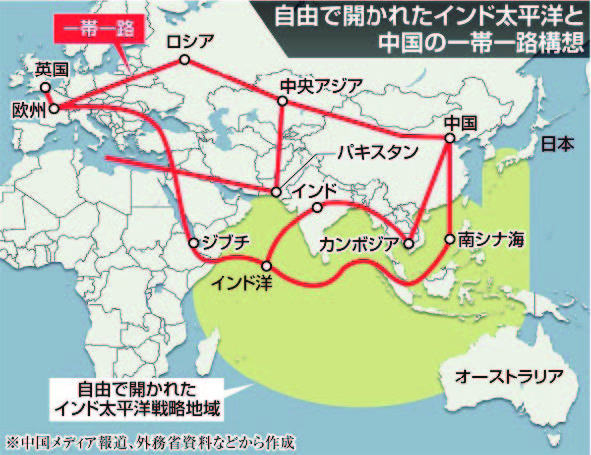
Sankei Digital News Diplomacy and Security Report 2020.10.20
Thank you, late former Prime Minister Shinzo Abe!
Japan’ s defense system and international defense cooperation
system are in place thanks to you.
All that remains is to revise the Constitution.
The people of Japan will inherit and fulfill your legacy.
